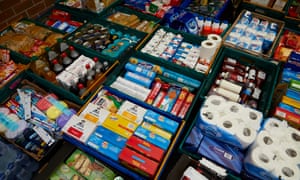
At a time when the UK’s likely break with Europe is widely expected to increase poverty and reliance on food charity, the Global FoodBanking Network is meeting in London to promote its corporate message of food banks as the link between food waste and food poverty, indeed a “green” intervention promising zero hunger. Given the lack of evidence, this is deeply troubling, especially in light of the UK government’s recent £15m fund to expand charitable surplus food redistribution.
We deeply oppose the further institutionalisation of charitable food banks in the UK. Over the last 35 years, the normalisation of food banking in the US and Canada has failed to solve entrenched food insecurity. However, food banking does benefit the reputations of Big Food and supermarket chains as good corporate citizens while distracting attention away from low wages paid to their workers. The emergency food bank parcel comes at a cost to recipients’ humanity and dignity.
Charitable food aid is a sticking plaster on a gaping wound of systemic inequality in our societies. On both sides of the Atlantic, the elimination of food poverty demands social and economic justice. At the heart of this approach must be a guarantee of the human right to adequate food and nutrition: living wages, income security and a fit-for-purpose welfare system, not “leftover” food for “left behind” people.
Professor Olivier de Schutter Former UN special rapporteur on the right to food
Professor Graham Riches University of British Columbia
Professor Valerie Tarasuk University of Toronto
Professor Janet Poppendieck City University of New York
Professor Tim Lang City University of London
Professor Martin Caraher City University of London
Professor Liz Dowler Warwick University
Dr Rachel Loopstra King’s College London
Pete Ritchie Nourish Scotland
Polly Jones A Menu for Change
Kath Dalmeny Sustain
Professor Mariana Chilton Drexel University
Mark Winne Author, Closing the Food Gap
Robert Egger Author, Begging for Change, Founder of DC Central Kitchen
Dan Crossley Food Ethics Council
Peter Kelly The Poverty Alliance
Dr Kayleigh Garthwaite University of Birmingham
Nick Saul Community Food Centres Canada
Professor Tiina Silvasti University of Jyväskylä
Andy Fisher Author, Big Hunger
Geoff Tansey Curator of Food Systems Academy
Dr Sinead Furey Ulster University
Professor Rebecca De Souza University of Minnesota Duluth
Professor Maggie Dickinson City University of New York
Joann Lo Food Chain Workers Alliance
Joshua Lohnes Food Justice Lab, West Virginia University
Professor Robert Gottlieb Occidental College
Dr Elaine Power Queen’s University, Canada
Professor Molly Anderson Middlebury College
Alison Cohen WhyHunger
Dr Anne C Bellows Syracuse University
Dr Flora Douglas Robert Gordon University
Dr Jahi Chappell Coventry University
Dr Colin Anderson Centre for Agroecology, Water and Resilience, Coventry University
Deirdre Woods Granville Community Kitchen
Sabine Goodwin Independent Food Aid Network
Dr Charlotte Spring University of Sheffield
Victoria Williams Food Matters
Dr Helen Crawley First Steps Nutrition
Gillian Beeley Together Lancashire
Professor Pat Caplan Goldsmiths, University of London
Professor Jon May Queen Mary University of London
Dr David Beck Bangor University
Robin Burgess Northampton Hope Centre
Dr Andy Williams Cardiff University
Imogen Richmond-Bishop Sustain’s Right to Food programme
Dr Chris Maughan Coventry University
Dr Madeleine Power York University
Dr Clare Pettinger University of Plymouth
Dr Koldo Casla Just Fair and Newcastle University
Dr Lopa Saxena Coventry University
Peter Roderick Institute of Health and Society, University of Newcastle
Dr Stefanie Lemke Coventry University
Wayne Roberts Will Work for Food Policy and author of The No Nonsense Guide to World Food
Professor Ernie Lightman University of Toronto
Paul Taylor FoodShare, Toronto
Dr Rod MacCrae Food policy analyst, Canada
Dr Adrienne Chambon University of Toronto
As Brexit looms closer…
… The Guardian is here to help guide you through whatever lies ahead. More people are reading and supporting our independent, investigative reporting than ever before. And unlike many news organisations, we have chosen an approach that allows us to keep our journalism accessible to all, regardless of where they live or what they can afford.
The Guardian is editorially independent, meaning we set our own agenda. Our journalism is free from commercial bias and not influenced by billionaire owners, politicians or shareholders. No one edits our editor. No one steers our opinion. This is important as it enables us to give a voice to those less heard, challenge the powerful and hold them to account. It’s what makes us different to so many others in the media, at a time when factual, honest reporting is critical.
Every contribution we receive from readers like you, big or small, goes directly into funding our journalism. This support enables us to keep working as we do – but we must maintain and build on it for every year to come.
[“source=theguardian”]


